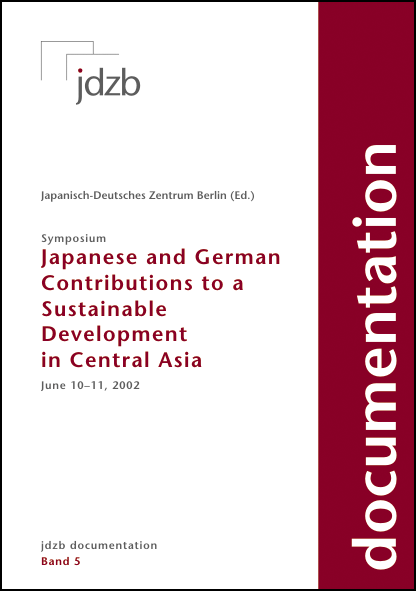Japan und Ostasien
Germanistik /
Deutsch als Fremdsprache
Kulinaristik
Kulturwissenschaften
|
 |
Senden Sie Fragen oder Kommentare zu dieser Website an:
info@iudicium.de
iudicium verlag
Dauthendeystr. 2 · 81377 München
Deutschland
Copyright · 2024
|
|
| |
|
 Japanisch-Deutsches Zentrum Berlin (Ed.) Japanisch-Deutsches Zentrum Berlin (Ed.)
Japanese and German Contributions to a
Sustainable Development in Central Asia
Symposium June 10–11, 2002
2003 · 978-3-89129-945-6 · 173 pp., paperback ·
EUR 27,–
(jdzb documentation Vol. 5)
The topic of our symposium is
Central Asia, a region whose geographical definition is not entirely
clear. For our purposes here we decided to focus on the four former Soviet
republics of Kazakhstan, Uzbekistan, Kyrgyzstan and Tajikistan.
After many years of total obscurity, Central
Asia now finds itself back in the headlines. I say “back in the
headlines,” because it occupied this position frequently during the
nineteenth century.
With the collapse
of the Soviet empire the days of colonialism were finally over. Central
Asia is no longer a mere chessboard for competing great powers. It is a
region with 50 million inhabitants, huge geographical potential, and
enormous supplies of raw materials. It is also a region threatened by
irresponsible forces, national egoisms, and environmental disasters.
Needless to say, the fate of Afghanistan, only recently liberated from a
sinister and irrational regime, remains crucial for the entire region.
Stability, therefore, cannot be achieved by economic development alone.
Our efforts also need to be focused on conflict prevention and the
establishment of civil societies. We need to support a new understanding
of the role of government. We need to encourage private investment, but
also to see to it that privatization does not squeeze out the poor or
further damage an already fragile environment. We need to re-examine the
anatomy of subsidies. We need to define the sometimes controversial role
of business. In short, we need to make development sustainable, lest it
compromise the ability of future generations to enjoy the same level of
welfare and freedom as the present generation.
CONTENTS
Volker Klein: Foreword ·
Shioya Takafusa: Opening Address · Colin Dürkop: Opening Address · Thomas
Matussek: Keynote Address: Germany and Central Asia · Nomura Issei:
Keynote Address: Looking for Japan-Germany Cooperation in Central
Asia
Part 1: Political
Aspects—Towards Stability in Afghanistan and Central Asia
Bulat Sultanov: Political
Aspects of the Route to Stability in Central Asia · Shimizu Manabu:
Towards Stability in Afghanistan and Central Asia—The Japanese Approach ·
Ulrich Brandenburg: Political Aspects Towards Stability in Afghanistan and
Central Asia
Part 2: Economic
Aspects—Towards Economic Development of Each Country in Central Asia and
Regional Cooperation
Siroj Azizov: Central Asian
Transport Infrastructure: Present Condition and Tendencies for
International Cooperation · Mouzaffar Olimov: German and Japanese Support
for Sustainable Development in Tajikistan · Murat N. Suyunbaev: Factors
Concerning the Integration of Central Eurasia · Per Fischer: Development
Tendencies of Central Asian Financial and Banking Systems After Eleven
Years of Independence · Heinrich Sobottka: Siemens in Central Asia · Uwe
Ohls: Development of the Socio-Economic Situation and Reform
Policy—Approaches of German Financial Cooperation in the Region · Nakayama
Ky ôko: Japan Giving Aid
as a Partner— Focusing on Experiences in Uzbekistan · Prianka Seneviratne:
Towards a Road Transportation and Trade Facilitation Strategy for Central
Asia
Part 3: Civil Society, Human
Security
Rainer Goerdeler: Keynote
Speech: The Central Asia Strategy and the Dialogue Between the
Partners · Wilhelm Höynck: Civil Society, Human Security— The Role of the
OSCE · Mushak ôji Kinhide:
Human Security in Central Asia—Proposition for a Security Assessment
System · Maulen Ashimbaev: The Situation in Central Asia after September
11 in the Context of the Region’s Security · Maruf Usmanov: Civic Society
and the Law-Based State as One of the Conditions Necessary for Protecting
the Rights of the Individual · Heinz Bühler: Civil Society and Human
Security
Policy Recommendations
Abbreviations
Program for the Symposium
List of Participants |
|
